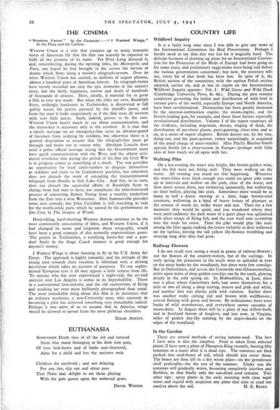THE CINEMA
4, Western Union." At the Gaumont.--,. I Wanted Wings." At the Plaza and the Carlton.
Western Union is a title that conjures up so many romantic vistas of American life that the film can scarcely be expected to fulfil all the promise of its name. Yet Fritz Lang directed it, and, remembering, during the opening titles, his Metropolis and Fury, one hoped he had brought to the screen the torrent of drama which flows along a nation's telegraph-system. Over its wires Western Union has carried, in millions of urgent phrases, almost a hundred years of American history. Its telegraph-forms have tersely recorded not only the epic moments of the nation's story, but the birth, happiness, sorrow and death of hundreds of thousands of citizens. Here, clearly, is material for as great a film as ever was made. But when the titles are over, Randolph Scott, strikingly handsome in Technicolor, is discovered at full gallop across the prairie pursued by the sheriff's posse, and from the start it looks suspiciously as if the film were all western with very little union. Such, indeed, proves to be the case. Western Union hasn't much to say about communication, and the morse-key is accessory only to the revolver. It is true that a timely message on an emergency-line saves an advance-guard of linesmen from scalping by redskins, but otherwise there is a general disposition to assume that the telegraph-line must go through and theirs not to reason why. Abraham Lincoln does send a polite official message saying that his Government must have quick communication with the West, and the almost acci- dental revelation that during the period of the film the Civil War is in progress comes as something of a shock. The -war provides an opportunity for local cattle-rustlers to disguise themselves as redskins and claim to be Confederate guerillas, but otherwise does not disturb the work of extending the transcontinental telegraph from Omaha to Salt Lake City. And this, in its turn, does not disturb the successful efforts of Randolph Scott to change from bad man to hero, no complicate the time-honoured process of converting Robert Young from a wealthy tenderfoot from the East into a wise Westerner. Slim Summerville provides some nice comedy, but John Carridine is still searching in vain for the worth-while parts which he earned by his performance as Jim Casy in The Grapes of Wrath.
Hard-riding, hard-shooting Western dramas continue to be the most consistently entertaining of films, and Western Union, if it had changed its name and forgotten about telegraphy, would have been a gdod example of this normally unpretentious genre. The prairie in Technicolor, a terrifying forest-fire and a gun- duel finale in the Stage Coach manner is good enough for anyone's money.
I Wanted Wings is about learning to fly in the U.S. Army Air Corps. The approach is highly romantic, and the attitude of the young men towards their vocation is informed with a shining mysticism which takes no account of purposes. To our sophis- ticated European eyes it all may appear a little remote from life. To anyone who has ever experienced a night-raid, the air-raid exercise over Los Angeles is comic in its improbability. There is a conventional love-interest, and the old excitements of flying and crashing are even more brilliantly photographed than usual. The most remarkable thing about this film is its insistence that an ordinary mechanic, a non-University man, who succeeds in becoming a pilot has achieved something very remarkable indeed. Perhaps it was naive of us to assume that in America wings would be allowed to sprout from the most plebeian shoulders.
EDGAR ANSTEY.






























 Previous page
Previous page